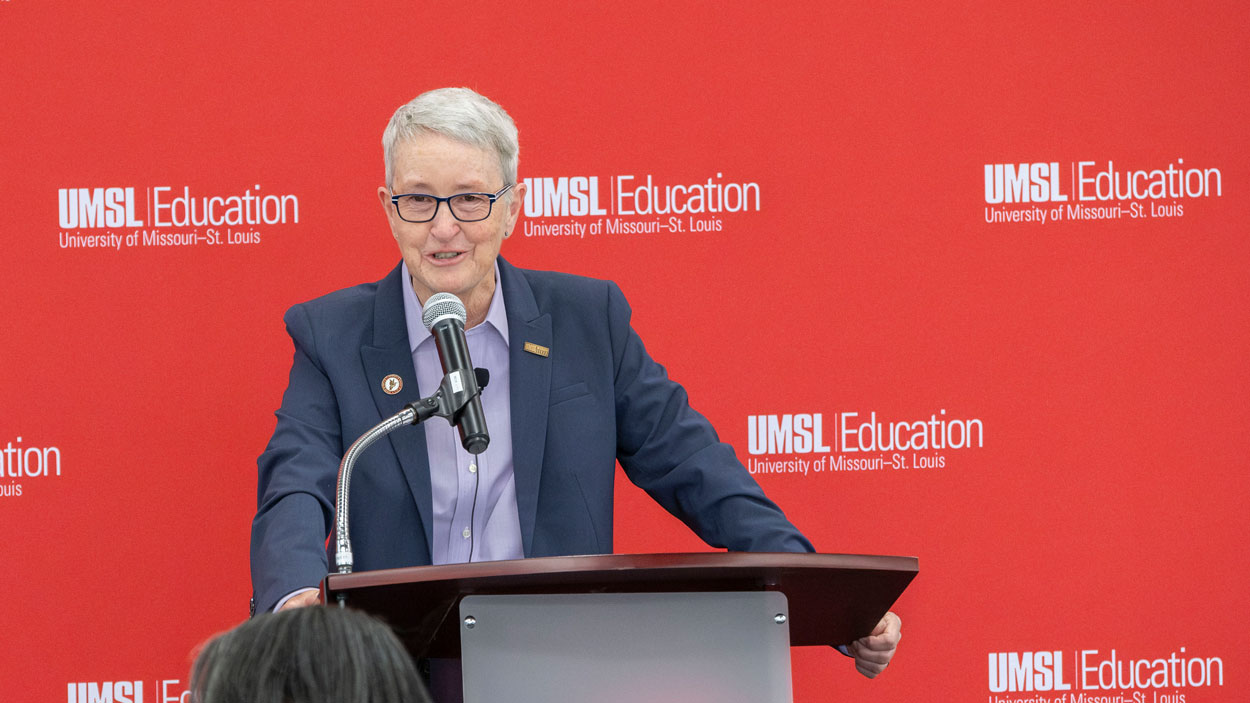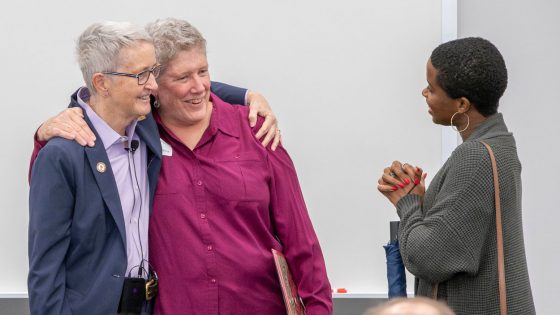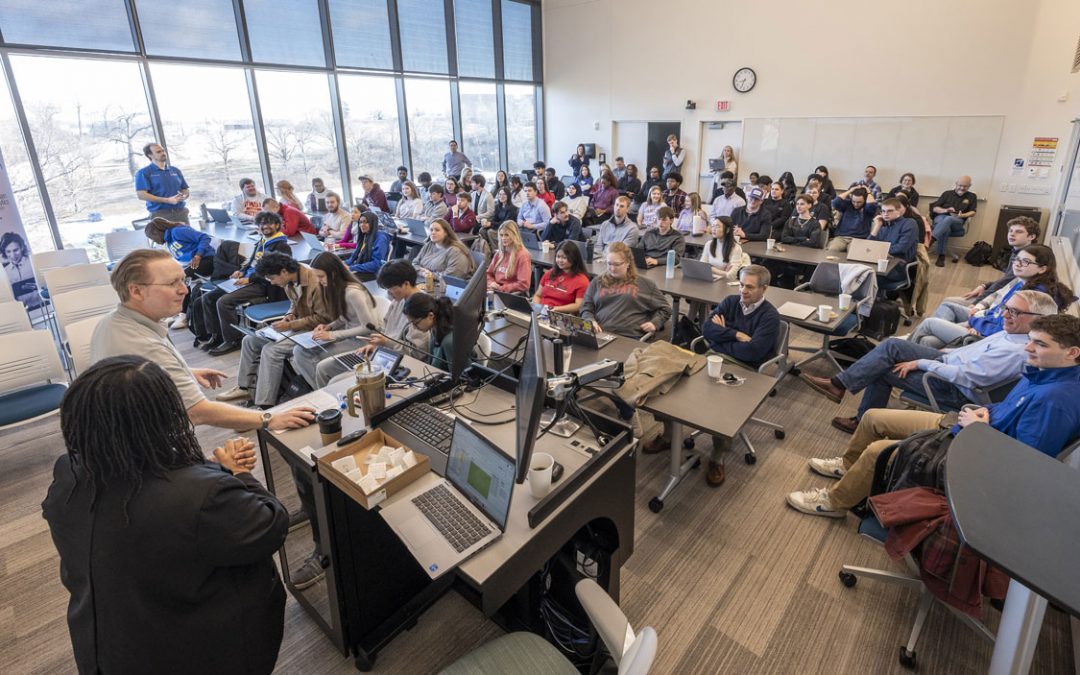
Dean Ann Taylor speaks to faculty, staff, alumni and other partners and supporters of the College of Education during an event to celebrate the end of the academic year and the work of the college last Monday in the ED Collabitat. Taylor is set to retire in July after 10 years at UMSL, the past eight as dean. (Photos by Derik Holtmann)
Ann Taylor still has a few more weeks of crossing the Mississippi River, bound for her office at the University of Missouri–St. Louis.
Taylor’s final morning trek to the campus in north St. Louis County from her home in Illinois will come on July 5, the official start of her retirement after 10 years of service to the College of Education, the last eight as dean. But she was already starting to feel emotional last Monday evening as she gathered with faculty, staff, alumni and other supporters, including area teachers and superintendents, in the ED Collabitat to celebrate the end of the academic year.
The event offered a chance to highlight a few of the projects being done by members of the College of Education that are impacting the wider community and allowed Taylor and Chancellor Kristin Sobolik to share preliminary plans with faculty and staff for relocating the college to North Campus as part of the Transform UMSL initiative. But it also served as an opportunity to celebrate Taylor and the impact she’s made through her leadership over the past decade.

Retiring Dean Ann Taylor (at left) gets a hug from Professor Susan Kashubeck-West while chatting with Assistant Professor Mary Edwin at an end-of-the-year celebration for the College of Education last Monday in the ED Collabitat.
“This is a fantastic time of year for celebration,” Sobolik said in welcoming remarks. “But I want to really express my great and deep appreciation and thanks to our wonderful dean, Dean Ann Taylor.”
Sobolik recounted when she arrived at UMSL to serve as provost and vice chancellor for academic affairs in 2017. One of her first tasks was to lead a nationwide search for a new dean of the College of Education. She began by reaching out to area superintendents to try to learn as much about education and its needs in the St. Louis region.
When Sobolik started looking at those needs – including how to train more teachers – and matching them with skills and experience of candidates for the position, she started to recognize that the strongest choice, Taylor, had already been serving in the role on an interim basis since the previous year, after two years as associate dean.
“I remember her sitting right here in this room, right here up front, and telling the audience of supporters here that she didn’t want any job,” Sobolik said. “She said, ‘I want this job. With these people. At this time. At this university.’ I was sitting in the front row, and I’m like, ‘Sold.’ That was fantastic.”
Turning to Taylor, Sobolik added: “You have proven yourself a fantastic leader for this particular point in time, for this university, for these people.”
Sobolik credited Taylor – a native of the United Kingdom who previously served on the faculty at Principia College and as the director of undergraduate and graduate elementary education at Southern Illinois University Edwardsville – for assembling a strong team at UMSL. She also noted the atmosphere of collaboration Taylor built within the college as it trained teachers and counselors ready to make an impact in their chosen fields.
Under Taylor’s leadership, the College of Education has counted about 1,500 students each semester studying to become classroom teachers, learning specialists, counselors and administrators in elementary and secondary schools across the region and state.
The college partners with about 150 organizations, including schools, clinics, agencies, business and recreational groups, to enhance students’ learning and provide them with real-world experience so they’re prepared for success after graduation.
Four of the past six Missouri Teachers of the Year earned degrees from UMSL.
Taylor has helped expand learning opportunities while also developing new programs, such as the Teach in 12 program that helps people with industry experience transition into careers as teachers.
The College of Education also added a bachelor’s degree program in sport management, housed in the Department of Education Sciences and Professional Programs and run in conjunction with the College of Business Administration, that gives students training in organizational, logistical and managerial aspects of sports. Graduates have gone on to hold a variety of roles in professional athletic organizations, intercollegiate athletics and youth recreation and sports programs.
It hasn’t always been easy.
“As I look now, these eight years together – wonderful times, shrinking Midwest enrollments, global pandemic, the steady sound of resources sucking out from public education – but it doesn’t matter,” Taylor said. “In the midst of these constraints, we have all done remarkable things together. I knew back in 2017 that this faculty and staff was a creative group. I knew they didn’t need me for their creativity. What they needed was an opportunity for collaboration, and I knew that leaders only lead when followers follow. So, as much as possible, I’ve led where you were already pointing, and I’ve acted on real ideas frequently initiated by you. My role was to hold that space large enough – and I hoped, calm enough – that your passions and curiosities could thrive.”
One area where the College of Education has undoubtedly thrived is in research. As Sobolik noted, the college has more than doubled the grants and contracts it has received over the past five years, including $7.78 million total in Fiscal Year 2023 – up from $3.82 million in FY2019 – and already $6.215 million through March of this year. The College of Education has received more than $30 million in external funding over the past five years, the most of any academic unit on campus.
Some of the faculty members leading the way in that success, including Jerome E. Morris, the E. Desmond Lee Endowed Professor of Urban Education; Associate Professor of Counseling Emily Brown and Associate Clinical Professor of Counseling Emily Oliveira; and Associate Professor Natalie Bolton gave short presentations about their work on Monday evening.
Taylor is quick to direct credit to them and many others.
“I do want to say since I announced my retirement, and at this event tonight, you have been warm and generous in your praise of my leadership,” Taylor said. “I am deeply grateful – deeply grateful – because I know who’s done all the work. Seriously, you have been absolutely remarkable, and I am just very humbled.”
She added: “I want you to know how deeply I think of you and how much you’ve touched my heart. You helped me grow into leader I never even knew I could be, and serving this institution, this faculty, at this time has been the greatest honor of my professional life.”














